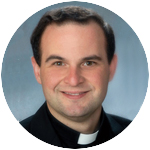
Father Eric J. Banecker
Springtime in West Philadelphia has a unique charm to it. The cherry blossoms emit a fragrance both sweet and fragile because — as so many things in life — they don’t last. Excited university seniors plan their escape to jobs, graduate schools, or service opportunities near and far. Young families tour the (very few) available homes, looking forward to putting down roots in a place with character.
In the church, too, spring has come upon us. The ordination invitations remind us that fresh groups of men will be ordained to the priesthood around the world. Students who gravitated toward groups like FOCUS in college decide that they too want to give a few years of service as a missionary. Communities emerge from the pandemic — occasional variants notwithstanding — with renewed vigor and vibrancy.
Or they don’t. I’m sure some readers are thinking that they don’t see many signs of life in their own journey of faith. Perhaps — like many — we are seeing the continued drifting apart of families, a loss of the practice of faith, even vocational crises in those we love. Maybe our own parish feels dead and lifeless. We might be left wondering: where has everyone gone?
[tower]
They can both be true at the same time – the extended winter and the seeds of springtime. They can be true because while the church particular and universal offers us real signs of life and hope for the future, a painful realignment is taking place as well.
Large physical plants and impressive looking org charts do not a vibrant church make, after all. Rather, animating those structures with the missionary spirit of the Gospel is what does that, as Pope Francis’ recent reform of the Curia reminds us. Too often, we can encounter mediocrity, cynicism, and the clericalism by which priests and bishops seek to rule over others. And, yes, occasionally we too can contribute to it.
But we don’t have to squint to see the work of the Holy Spirit in our day.
When secular, non-Christian newspaper columnists call for a more sincere Christianity in our public leaders, we should take notice. When those struggling with sin and on the margins of the church suddenly find a home in a Catholic parish and seek liberation from their vices, we should rejoice. When thousand-year-old religious communities experience renewal of their charisms which attracts people and gives vibrancy to the church, we should sing a Te Deum.
As then-Cardinal Ratzinger predicted 50 years ago, this renewal is not about increasing our secular influence or preserving physical or administrative structures. Those things come and go and are not to be sought for their own sakes. Nor, as he also predicted, will this be a movement of the “left” or the “right:” such categories are far too simplistic to describe the multivalent and surprising work of the Holy Spirit.
And so, as we approach the liturgical commemoration of the week that transformed human history, we should allow ourselves to be transformed anew. Whatever habits of mind and action prevent us from following the way of Christ, we should allow Christ to bear them on his road to the cross this week.
We should recall as well the great hope that the cross represents: Ave Crux, spes nostra! This was the hope that animated at the last possible moment the soul of a common criminal at the end of his rope: “Jesus, remember me when you come into your kingdom!” And, after all, didn’t he tell the crowds that, “many that are first will be last and the last will be first?”
In him, if we’re honest, we should see ourselves. And if we see ourselves then we see the whole world: the faithful and the negligent, the unbeliever and the nonbeliever, the saint with a past and the sinner with a future. Yes, we were all there that day, on that hill outside of Jerusalem. And we need only entrust ourselves to the savior of the human race, that he may remember us when he comes into his kingdom.
It is a kingdom that he inaugurated definitively on that first Good Friday. Three days later, the reality of the kingdom was confirmed for all time. Even now, the Spirit which he left us continues to fill the hearts of believers, making a permanent springtime out of the winter in our hearts.
PREVIOUS: Love’s Day: Easter unwraps the gift of redemption
NEXT: Queen of Peace vs. the lords of war



Share this story